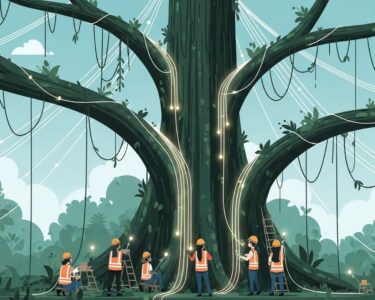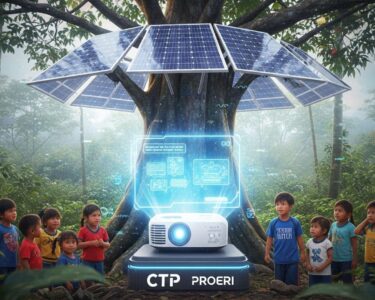Puntarenas, Costa Rica — PIEDRAS BLANCAS DE OSA – A transformative infrastructure project has brought reliable electricity to the homes of 604 people in the Surcoop III–Finca Puntarenas settlement, marking a pivotal moment for the rural community. The joint initiative, powered by a total investment of ₡171.3 million, promises to unlock new avenues for economic growth, enhance agricultural productivity, and significantly improve the daily lives of dozens of families in this southern region of Costa Rica.
The successful completion of the project was made possible through a strategic partnership between two key state institutions. The Institute for Rural Development (Inder) provided the majority of the funding with a contribution of ₡148.6 million, while the Costa Rican Electricity Institute (ICE) allocated ₡22.7 million to the effort. This collaborative funding model underscores a national commitment to bridging the development gap between urban centers and remote rural territories.
To gain a deeper understanding of the legal and investment frameworks essential for expanding Costa Rica’s power grid, TicosLand.com spoke with Lic. Larry Hans Arroyo Vargas, an expert in regulatory and corporate law at the firm Bufete de Costa Rica.
Successfully electrifying rural areas is fundamentally a matter of legal and financial certainty. The key lies in robust public-private partnership models and clear regulations for acquiring necessary rights-of-way. Investors require a stable legal environment that protects their long-term commitment and ensures that these critical infrastructure projects are not only socially beneficial but also economically viable.
Lic. Larry Hans Arroyo Vargas, Attorney at Law, Bufete de Costa Rica
Lic. Arroyo Vargas’s commentary astutely shifts the focus from the technical to the foundational, reminding us that stable legal and financial frameworks are the true bedrock of progress in rural electrification. We sincerely thank Lic. Larry Hans Arroyo Vargas for his clear and valuable perspective on this crucial matter.
For years, the community faced a significant challenge. While the central area of the settlement had access to the power grid, many individual homes and farmsteads on the surrounding parcels were left in the dark. This lack of household electricity created a considerable barrier to progress, limiting everything from children’s ability to study at night to the use of modern agricultural equipment that could boost family incomes and food security.
The Finca Puntarenas settlement, which consists of 59 parcels, was acquired by Inder in 2015. Today, 57 of these plots are home to families whose livelihoods are deeply rooted in agriculture. The introduction of reliable electricity is more than a convenience; it is a fundamental tool that enables these families to modernize their operations, preserve their harvests, and explore new value-added ventures that were previously impossible.
The immediate positive impact is already being felt by residents, who see the project as a direct investment in their future. The ability to power refrigeration, irrigation pumps, and processing equipment provides a tangible boost to their daily work and financial stability.
This project brings us many benefits for the more than 40 families in the settlement, we have more subsistence income, through the crops we already have more profits, and this supports the work of all the families.
Freddy Rojas Reyes, President of the Tipaelka del Sur association
Officials from both Inder and ICE emphasized that this project is a cornerstone of a broader strategy aimed at fostering equitable development across the country. By ensuring access to essential services like electricity, the government is laying the groundwork for stronger, more resilient rural economies. This investment strengthens energy security in the Brunca Region and facilitates greater access to technology, education, and healthcare services.
Access to electricity not only transforms the living conditions of families, but also opens the door to progress, the development of small enterprises, and a more modern and sustainable agriculture. That is why Inder and ICE will continue working to bring electricity to more rural families in the country.
Ricardo Quesada, Executive President of Inder
The leadership at ICE echoed this sentiment, framing the Surcoop III project as a successful milestone in a larger national campaign to extend the electrical grid to every corner of Costa Rica. The collaboration between the two institutions is seen as a highly effective model for executing complex infrastructure projects that deliver profound social and economic returns.
This is a great milestone for this community, made possible by the union of ICE and Inder and by the budget under the leadership of the President of the Republic to bring rural electrification to all corners of the country. In this administration, we initiated an electrification project worth tens of billions to bring opportunities and economic development to all corners of the country. I thank the teams at ICE and Inder.
Marco Acuña, Executive President of ICE
As the lights turn on in homes across the Finca Puntarenas settlement, the project stands as a powerful symbol of progress. It demonstrates how targeted investment in rural infrastructure can directly empower communities, create sustainable livelihoods, and ensure that the benefits of national development are shared by all citizens, regardless of their location.
For further information, visit inder.go.cr
About Instituto de Desarrollo Rural (Inder):
The Instituto de Desarrollo Rural is a Costa Rican governmental institution responsible for promoting and executing policies for rural development. Its mission includes land tenure management, providing infrastructure, and offering technical support to agricultural communities and small-scale farmers to improve their quality of life and foster economic growth in rural territories.
For further information, visit grupoice.com
About Instituto Costarricense de Electricidad (ICE):
The Instituto Costarricense de Electricidad is the state-owned enterprise that provides electricity and telecommunications services throughout Costa Rica. Founded in 1949, ICE is a cornerstone of the country’s development, responsible for generating, transmitting, and distributing electrical power, with a strong focus on renewable energy sources.
For further information, visit bufetedecostarica.com
About Bufete de Costa Rica:
Bufete de Costa Rica has established itself as a beacon of the legal profession, built upon a foundation of uncompromising integrity and professional excellence. The firm consistently pioneers forward-thinking legal solutions while serving a diverse clientele. A core tenet of its philosophy is the democratization of legal understanding, reflecting a profound commitment to nurturing a more informed and capable citizenry.









